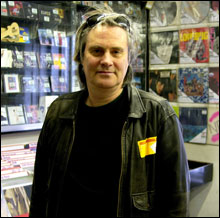 Rick Harte literally suffered to stake out his role in Boston music history. “When I got interested in recording live music, I had the Crown company build me a two-track recorder,” he explains. “This was in about 1977. I started going to clubs and recording jazz bands to learn how to make good live recordings, which seemed extremely difficult — especially later when I got interested in recording rock bands with vocals.
Rick Harte literally suffered to stake out his role in Boston music history. “When I got interested in recording live music, I had the Crown company build me a two-track recorder,” he explains. “This was in about 1977. I started going to clubs and recording jazz bands to learn how to make good live recordings, which seemed extremely difficult — especially later when I got interested in recording rock bands with vocals.
“I got paranoid about leaving the recorder in my apartment over a Memorial Day weekend, so I tried to bring it down the stairs and out to my van myself. It weighed about 100 pounds. I fell down the stairs with it and broke my arm badly. Somehow I managed to hoist it up using some two-inch tape reels and kicked it into the back of the van.” Then he went to the hospital.
Shortly after Harte healed, he embarked on one of the most illustrious and influential careers in local rock history. As the founder of Ace of Hearts Records and the producer of early recordings by Mission of Burma, the Neighborhoods, the Lyres, the Nervous Eaters, the Infliktors, the Neats, and a host of other bands, he helped create a blueprint for Boston’s club-rock sound that endures today. And its indelible lines can be found on the just-released Ace of Hearts retrospective 12 Classic 45s, a sonic blurt from the ’70s and ’80s built of Harte’s trademark punchy sound and progressive, artist-inclined aesthetic.
Ace of Hearts released terrific albums by the aforementioned bands and others, but it’s really the 25 tunes here that had the most impact. In particular, Mission of Burma’s “Academy Fight Song” backed with “Max Ernst” and the Lyres’ “I Want to Help You Ann” with “I Really Want You Right Now” had nationwide repercussions, fueling the post-punk era and the second coming of garage rock.
“I never wanted to be a producer, per se, or have a record label, but there was a great scene here in the wake of the punk-rock revolution and nobody was making records with these bands that had something important to say. I just wanted to make the best records I could. Most punk 45s had cheap packaging, lame artwork, and bad sound. I had already been collecting records for years and still have the 45s I bought in the ’60s. They looked and sounded great. I decided there was no reason why the records I made couldn’t do the same.”
Harte’s sincere passion for music can be traced back to a single night in the mid-’60s. “There was no turning back for me after my dad came home from work one day and said, ‘How would you all like to go see the Beatles?’ We jumped up and down and got in the car and went to Suffolk Downs for the concert. The energy was amazing. After that we’d sit at home playing all the new 45s over and over.”